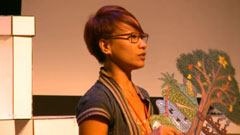Taring Padi
“Art, Activism and Rock ‘n Roll” defines the work of the Indonesian art collective Taring Padi. Founded in 1998 during the fall of president Suharto, Taring Padi works to counter what the group has defined as “Five Cultural Evils, namely”: imperialism, capitalism, militarism, feudalism and elitism. Their work boldly declares a dependency on sociopolitical issues, intimately connecting politics with artistic practice. Taring Padi believes in a culture of a people with a collective voice; their work is often produced communally, with members taking turns leaving their marks. Although Taring Padi works in a variety of media, from kinetic sculptures to techno music, they are most well known for their cartoonlike posters imbedded with political and social justice messages as well as their traditional woodcuts, which engage with contemporary social and political issues relevant to Indonesia and the world at large. One of their more powerful projects includes their commemoration of the Sidoarjo mudflow, a natural disaster presumably caused by unregulated industrial development, which destroyed twelve villages, displaced over 60,000 people, and continues to wreak havoc on the region. To combat the pervasive devastation, which includes catastrophic economic costs and the contamination of the Porong River, Taring Padi used their art to revive and empower the affected communities. On the fourth anniversary of the mudflow’s eruption, the group supplied children of the neighboring towns with painting supplies, later encouraging them to participate in a community-wide concert. To accompany these events, Taring Padi artists crafted giant puppets that both delighted the townspeople who operated them, and symbolized the industrial and--or “brought to trial” governmental entities responsible for their oppression whom, to this day, have not yet been prosecuted. In spite of this injustice, Taring Padi’s involvement enabled the residents to finally express their frustrations while also providing a space in which they could temporarily forget abouti them for the first time.
Founded in 1998 in Yogyakarta, Indonesia

